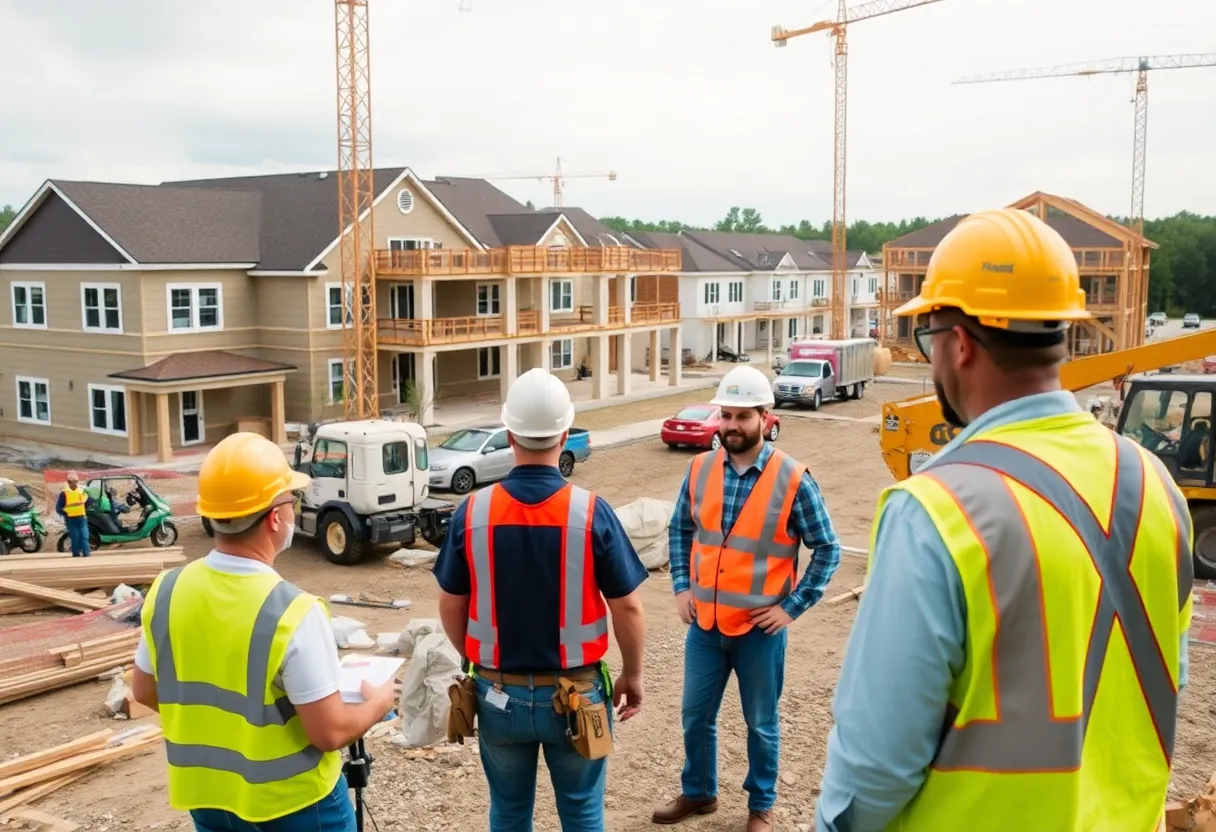News Summary
The construction sector in North Carolina is poised for significant growth despite challenges in the national market. With a 13% rise in employment and an 11.4% increase in wages since 2021, the state ranks as the fifth strongest for construction nationwide. Industry experts emphasize strategic expansion and diversification opportunities, particularly in data centers and residential sectors. While market conditions may pose difficulties, North Carolina’s robust economic activity and demand for infrastructure continue to drive positive trends in construction.
Raleigh, North Carolina — Construction Industry Continues to Show Robust Growth Despite Market Challenges
The construction sector in North Carolina remains resilient and is projected to experience significant growth over the next few years, even as broader economic conditions forecast some flattening or potential contraction in national construction spending. Industry experts highlight strategic approaches for companies to capitalize on emerging opportunities while navigating rising costs and competitive market conditions.
Market Insights and Economic Outlook
Despite national economic forecasts indicating a possible slowdown in construction spending, North Carolina’s construction industry stands out as one of the strongest across the United States. A recent analysis shows that the state has ranked fifth in the nation for construction strength, supported by consistent employment increases and a steady rise in permits issued. From 2021 to 2024, construction wages in North Carolina grew by 11.4%, while employment in the sector increased by 13%, reflecting a healthy demand for workers and ongoing investments in infrastructure and development projects.
During the same period, North Carolina issued approximately 19.11 new construction permits per 1,000 housing units, indicating ongoing demand in the residential sector. However, while overall residential construction is forecast to expand significantly, some segments, such as multifamily housing, have experienced slight declines due to rising interest rates which impact borrowing costs.
Sector Performance and Investment Opportunities
The residential sector in North Carolina is expected to see substantial growth in the coming years, driven by population increases and urban expansion. Specifically, sectors such as data centers are projected to grow at an average rate of 5% annually for the next five years. North Carolina has experienced an impressive expansion in data center construction, with figures showing a 15-fold increase over the past decade, reflecting a national trend toward cloud computing and data storage infrastructure.
Other sectors anticipated to see increased spending include lodging, power, transportation, and education. Conversely, certain areas such as religious facilities, public safety, and manufacturing are forecasted to experience either flat or declining investment levels in the near term.
Regional Growth Patterns and Metropolitan Trends
Major metropolitan areas in North Carolina are expected to experience varying levels of growth. The Raleigh/Durham/Chapel Hill, Charlotte, Greensboro, Wilmington, and New Bern regions are forecasted to see the most significant development activity. These areas are likely to attract new projects driven by economic vitality and population influx. Conversely, cities like Winston-Salem, Hickory/Lenoir/Morganton, Burlington, and Fayetteville are projected to have slower growth due to market saturation or economic factors.
Strategies for Market Expansion and Diversification
Construction companies aiming to grow in North Carolina and beyond are advised to consider several strategic options. These include expanding services, entering new industry sectors, and pursuing geographic diversification. Among these, geographic expansion remains the most complex and common goal. Success in new markets requires thorough research into demand, competition, operational costs, and regulatory environments.
Business leaders are encouraged to evaluate their motivations for expansion carefully, ensuring alignment with market needs and resource availability. Conducting detailed feasibility studies and considering acquisitions as growth catalysts can be beneficial but necessitate careful analysis to ensure added value and manageable investment levels.
Guidelines for Successful Expansion
Key considerations for companies contemplating expansion include assessing staffing needs, understanding market demand, and positioning the brand appropriately in new locations. Leaders should also analyze the competitive landscape and operational efficiency in potential markets before committing resources. Strategic planning and market research are critical components in reducing risks associated with geographic diversification.
Construction Industry Trends Nationwide
Nationwide, North Carolina’s construction industry ranks as the fifth strongest according to a recent study. From 2021 to 2024, the state experienced an 11.4% increase in construction wages and a 13% rise in employment. The number of new permits per 1,000 housing units signifies ongoing construction activity. In comparison, Idaho holds the top position for construction strength, followed by Arizona, Texas, and Utah. Conversely, Pennsylvania ranks as the weakest in national construction strength, based on data from labor and census agencies.
Overall, the North Carolina construction industry demonstrates resilience and growth potential, driven by strategic market positioning and regional economic vitality, despite potential headwinds from rising costs and national economic uncertainties.
Deeper Dive: News & Info About This Topic
HERE Resources
Seattle’s Healthcare Landscape is Undergoing Major Transformation
Federal Reserve Keeps Interest Rates Unchanged Amid Economic Concerns
Jersey City Reports Major Financing Activity in Multifamily Real Estate Sector
Compass Reports Record Financial Results in Q2 2025
Baltimore Developer Files for Chapter 7 Bankruptcy
Beaver Dam, Wisconsin, Plans Major Data Center Development
New York City: Economic Data and Fed Meeting Impacting Real Estate
Fresno Real Estate Market Faces Challenges Amid Rising Investor Ownership
Punta Cana Develops Largest Oceanfront Resort in the DR
New Enoch Pratt Free Library Branch Breaks Ground in Baltimore’s Park Heights
Additional Resources
- CBS 17: North Carolina has 5th strongest construction industry
- Wikipedia: Construction industry
- Business North Carolina: Protecting your construction budget in 2025
- Google Search: North Carolina construction growth
- News & Observer: Real estate news in North Carolina
- Encyclopedia Britannica: Construction
- National Law Review: Antitrust compliance for construction companies
- Google News: North Carolina construction industry
- Ward and Smith: Highlights of North Carolina construction legends
Author: STAFF HERE VIRGINIA BEACH WRITER
The VIRGINIA BEACH STAFF WRITER represents the seasoned team at HEREVirginiaBeach.com, your trusted source for actionable local news and information in Virginia Beach, Virginia Beach City, and beyond, delivering "news you can use" with comprehensive coverage of product reviews for personal and business needs, local business directories, politics, real estate trends, neighborhood insights, and state news impacting the region—supported by years of expert reporting and strong community input, including local press releases and business updates, while offering top reporting on high-profile events like the Virginia Beach Neptune Festival, East Coast Surfing Championship, and military homecoming celebrations, alongside key organizations such as the Virginia Aquarium, Virginia Beach Convention Center, and Oceana Naval Air Station, plus leading businesses in tourism and defense like Busch Gardens and Northrop Grumman, and as part of the broader HERE network including HEREWilliamsburg.com, providing credible, in-depth insights into Virginia's vibrant landscape. HERE Virginia Beach HERE Williamsburg





